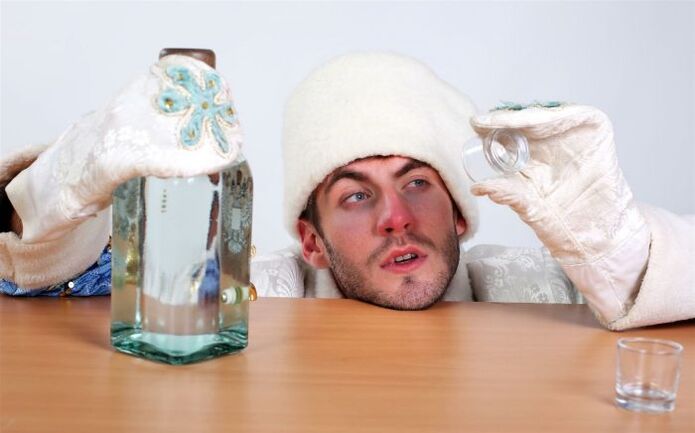Alcoholism is one of the most discussed topics. It threatens relationships in the family and society as a whole. Not surprisingly, after a while, a patient's loved one wonders how he or she can stop drinking?
Reasons for alcohol addiction
Before figuring out how to help a person quit drinking, you need to understand why he's drinking. By isolating the root cause, you have a better chance of curing the person's conviction. Oftentimes, an alcohol addiction begins as a psychological addiction, so it is important to help a person understand that this is an addiction, not a habit. In most cases, there are four reasons people start drinking:
- for company;
- relieve stress;
- boring;
- by habit.
A common reason a person starts to get addicted to alcohol is drinking for the company. Being the only stubborn person among friends, it is difficult to maintain a tough attitude. For some people, especially teenagers, it is an honor to support the company in its endeavor.

When a person is not surrounded by rainbow environment and constant problems at work, he starts to drink alcohol to relieve this stressful pressure. When drinking strong feelings, negative emotions, it seems for a second that the problem does not exist. In fact, it won't go away anywhere if you don't make a decision about it. As a result, a viable exit in such a situation must be repeated. When the drunkenness is over, the person plunges into negative emotions again, concluding that to avoid them, one must not stop drinking.
Drinking to relieve boredom is a loose concept. This is not a short-term situation where one has nothing to do. We are talking about a long period of time when a person is faced with a situation that does not allow him to use force, to focus on something specific. More often in this state, a mechanism is activated to help come to terms with oneself.
The most dangerous reason why it is so difficult to answer the question of how to help an alcoholic quit is habitual alcoholism. In this case, it is very difficult for a person not to drink, since the habit has become daily for him and it is difficult to imagine his life without it. In this case, the motivation to quit drinking must be very serious, otherwise it will be almost impossible to convince a person to quit.

It is often difficult to point to any reason for the origin of the addiction. All of this is tightly coupled and works in conjunction with each other. When alcoholism reaches its final stages, we are talking about physical cravings for alcohol. In this case, it is not possible to quit alcoholism without medication. If a person himself wants to get rid of the disease, this will greatly help in future treatment.
Is persuasion effective?
How to get an alcoholic to cure? In fact, there are many ways to discourage a person from drinking. The most common way is to convince the person to quit drinking. This is a gentler way to help him.
You can stop drinking in more radical ways - this is the nerve shock after drinking. This segment also includes patient threats. A third area of support is the addition of medicines or folk treatments to foods. Before you understand how to help an alcoholic quit drinking, it's a good idea to find out where the form of alcoholism lies, what exactly drives the addiction.

Since adding some medicinal or folk remedies to food is a very radical method, requiring caution and prior consultation with a doctor, it is advisable to start with gentler methods, In particular, you need to help alcoholics talk.
During these conversations, you should try to get the person to stop drinking. The most effective way to convince an alcoholic to receive treatment would be in the early stages of alcoholism, when the person has not seriously lost the ability to perceive reality.
Before you start the conversation, think about the facts that you would give the alcoholic. If he saw how terrible it looked from the inside while drunk, perhaps this would push him to radical decisions. Perhaps he wanted to give up on himself, but the will wouldn't allow it due to the lack of a "really important" reason.
How to convince an alcoholic of the harmful effects of his habit? Best for family gatherings or friendly advice. The circle in this conversation should only be with the closest people that the person trusts. In the early stages, it is very easy for a person to quit drinking. Enough telling him about his drunken behavior, show him a tape from a recent party. If a person has not lost the ability to think fully, he will be afraid and ashamed of his behavior, stop drinking.

It would be nice to remind you of a hangover, especially when it doesn't allow you to spend time with your family or in a way that the sick person likes. It is important that any habit must be maintained, which means spending money on it. Do the calculations by showing them off on movie trips, kids rides, and other activities.
It is important that you prepare in advance for the fact that your efforts to find a way to get you to quit drinking will be viewed with hostility, resentment, and arguments. In this case, it is very important to remember the answer to the question. Is it possible to burst into tears or, conversely, freely agree to the conditions set by the patient? There are no cases. It is better to explain in a calm voice that no one is forcing anyone, but why not pay attention to the available alternatives.
If you try to leave the theory of how to persuade a person to be treated in order to achieve a particular result, there is no way that you will not abandon him in such a situation. Continuing to support, perhaps he himself did not know how to detox for himself. Not everyone can quit drinking at home. Find a suitable clinic, make an appointment with the doctor, help the person to come to the clinic. An alcoholic needs help more than ever.
Another choice
One of the unwanted options used is threatening, if you're thinking about how to help, quitting can be very difficult and can cause additional stress. It must be understood that this working technique can lead to the opposite effect.
This method is suitable only for patients who correspond to a certain psychological type. Some may perceive this behavior with aggression, which is clearly not the best response.
Persuasion, arguments, and threats don't always work. Sometimes this is not enough if alcoholism has progressed to a deeper stage. In this case, you need to use specific drugs. These can be common medicines or something from folk recipes.
With the help of industrial pharmaceutical drugs, it is possible to develop a feeling of aversion to alcohol in drinkers. Such methods are available even if a person does not know that he accepts them, although the desire to get rid of addiction directly helps to achieve more.

The drug is added to alcohol or food. This often leads to a decline in health immediately after drinking alcohol. After a few such cases, alcoholics begin to associate their bad condition with alcohol and think about stopping drinking.
Medicines used for such purposes contain disulfiram or cyanamide. As a result, the body cannot process ethyl alcohol normally. There is a build-up of breakdown products in the blood, which becomes the cause of persistent intoxication.
During this treatment, as soon as you notice the effects of the drug, you should talk differently, suggest that the alcoholic get treatment. It is important to describe the advantages of inpatient treatment:
- avoid recurrence;
- psychological help;
- continuous monitoring of health status;
- Repair internal damage.
The best way to get rid of addiction is treatment in a hospital, where the patient will be constantly monitored by an orator. The smallest number of relapses was observed with this treatment.
Stages of alcoholism
Alcoholism is often divided into three stages, each of which will have specific symptoms and some health consequences. The first stage is more difficult when determining the problem by the person's appearance. Unbeknownst to himself and those around him, a person gradually increases the dose of what he drinks, as he gains a certain amount of experience, which does not allow him to reach the same level of intoxication. desired with the same amount of alcohol.
Already in such a state, a person cannot stop and stop drinking, unless he is pointed out to him about the respective problem. After a person drinks alcohol, he begins to experience nausea and vomiting. Patients often have memory loss, can not remember what they did last night. Memory loss is part.

As a result, after the first stage of alcoholism, a person is faced with constant drinking. At the same time, one drink can be repeated two or three times a week. The problem in this case was a lack of care from the loved one, and as a result the addiction worsened.
As a person moves into the second stage of alcoholism, the outward signs become more noticeable. The first bouts of intoxication, when a person drinks alcohol without a break for two or three days, indicates the formation of alcoholism of the second degree. At this point, a form of physical addiction begins to form.
The person begins to feel nauseous, as this is the only way to relieve the condition. Such symptoms are clear signs of the second stage of the disease. In addition, patients often feel weak, headache, dizziness, nausea, sweating. An unpleasant tremor begins to spread throughout the body, it is first expressed in the hands. The second phase can last for years, up to two decades, but can be limited to two years. At the end of the second stage, a person no longer has the opportunity to deal with the problem on their own, only a doctor will help.
The final stage is the third stage. When it was formed, everyone could view a person as an alcoholic. Appearance begins to change. A person with a constantly swollen face, a kilometer away from him reeked of alcohol. At this time, many chronic diseases are formed, severe mental disorders and other problems are manifested. In such a state, people, as a rule, were left without family or surrounded by people in the same state. In the third stage of alcoholism, a person loses his or her social position, the ability to think critically. In this case, it is difficult to return to normal life.


























